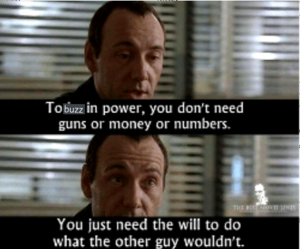Difference between revisions of "Keyzer Soze rule"
Jump to navigation
Jump to search
Matt Weiner (talk | contribs) (VCU does in fact still use this term.) |
Kevin Wang (talk | contribs) |
||
| (One intermediate revision by one other user not shown) | |||
| Line 1: | Line 1: | ||
<onlyinclude> | <onlyinclude> | ||
| − | The '''Keyser Soze rule''' is a periphasis of a line from the film ''The Usual Suspects'' employed by [[Seth Kendall]] when asked about the way to become good at quizbowl, in which it is noted that to became powerful all one needs is "the will to do what the other guy wouldn't". | + | The '''Keyser Soze rule''' is a periphasis of a line from the film ''The Usual Suspects'' employed by [[Seth Kendall]] when asked about the way to become good at quizbowl, in which it is noted that to became powerful all one needs is "the will to do what the other guy wouldn't".</onlyinclude> |
| − | + | [[File:Soze.png|thumb]] | |
| − | |||
| − | [[ | ||
==Examples== | ==Examples== | ||
Latest revision as of 13:10, 7 June 2021
The Keyser Soze rule is a periphasis of a line from the film The Usual Suspects employed by Seth Kendall when asked about the way to become good at quizbowl, in which it is noted that to became powerful all one needs is "the will to do what the other guy wouldn't".
Examples
The prototypical example of this was the massive studying regimen in all subjects undertaken by Kelly McKenzie, Kendall's teammate at Kentucky, whose apartment was overflowing with notecards which he spent most of his free (and unfree) time perusing. More generally, this refers to individuals who seek out weaknesses on their team and explicitly study them to fill in gaps.
